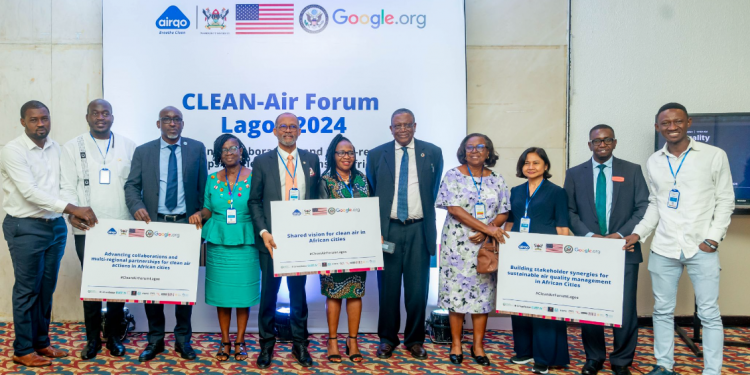Lagos State government has put all measures in place in empowering the regulatory environmental agencies like Lagos Waste Management Authority (LAWMA), Lagos State Environmental Protection Agency (LASEPA), Lagos Metropolitan Area Transport Authority, (LAMATA) and others (based on the available data) to develop policies aim at mitigating air pollution in the State so as to ensure good, healthy and quality air at all times.
Prof. Akin Abayomi, Honorable Commissioner, Lagos State Ministry of Health, made this submission while speaking with journalists at the recently concluded Clean-Air Forum in Lagos State against the backdrop of bad quality air being experienced in some African countries such as Doringkloof in South Africa, Ngagara Bujumbura in Burundi, Avenue des Avateurs, Kinshasa in D.R among others.
According to the Commissioner, in a situation where there is bad quality of air which makes the environment unhealthy for residents, people with respiratory or heat disease, the elderly and children should avoid intense outdoor activities and at the same time outdoor activities should be limited for all residents of the area.
In preventing such from happening in megacity state like Lagos, Prof. Abayomi said ‘for instance in health sector, we have an Environmental Health Directorate that monitors not just water quality, food safety and all kinds of things. These regulatory function of government is to make sure that whatever economic activity you are into does not contribute to an environmental hazard.
‘These agencies are going out to monitor generators, they are going out to monitor water that is coming out of your factories and ensure it is not containing chemicals. Are you just dumping them into our streams or our canals? Considering the fact that we have such a large number of people in Lagos, everybody is producing some kind of waste products or the other, the question is, is your waste product a problem for the environment? And that’s those are the things that we need to check as responsible government’ he stated.
Prof. Abayomi who harped on adequate information dissemination to the people opined that ‘people need to be informed about the risk of a certain level of air quality so that they can protect themselves. You want to give information out to the public about what are the air polluting practices that they are conducting? What is their own contribution towards clean? Lagos for example, if you have a generator, or you have solar panels, which one would you choose? You also have to be a conscious citizen, that your generator is producing air pollutants whereas if you spend the same amount of money on solar generator which is a renewable energy and has no pollutants at all. So those are the kinds of things that we as government need to educate the citizenry. Government is reducing taxes on solar panels so that it’s getting cheaper. Fossil fuel is getting more expensive, generators are more expensive, so it makes sense for you to convert to renewable energy, which now reduces air pollution’ he concluded.
In her remarks, Prof. Folasade Ogunsola, the Vice Chancellor, University of Lagos
acknowledged the importance of collective action in addressing the challenge of air pollution.
Represented by Prof. L.O. Chukwu, Deputy Vice Chancellor
(Management Services) University of Lagos, Prof. Ogunsola noted that ‘As a University, we are committed to supporting research, education, and community engagement that promotes environmental sustainability and public health. We believe that clean air is a fundamental right, and we must work together to ensure that future generations inherit a healthier and more sustainable environment.
Clean-Air Forum Lagos 2024 themed “Advancing collaborations and multi-regional partnerships for clean air actions in African cities, with participants from many countries around the world.











